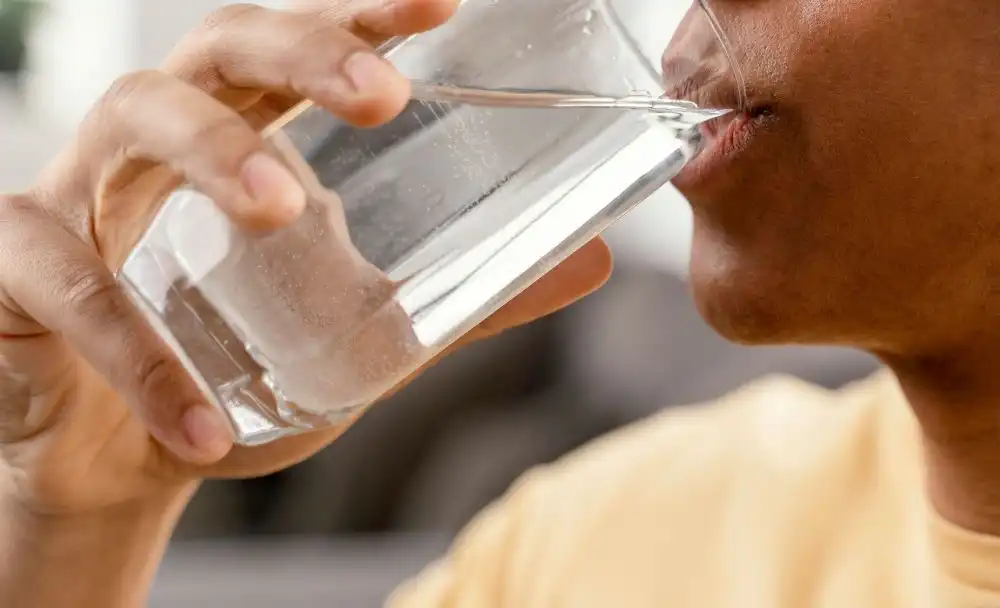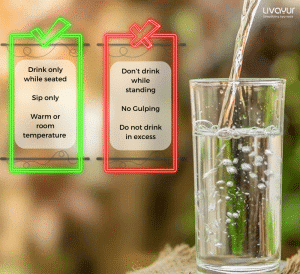This article is reviewed by an expert

Water is essential for life. It makes up about 60% of the body weight of an average adult male and about 55% [3] of the body weight of an average adult female. Water plays a crucial role in maintaining our overall health and well-being. In this blog, we will discuss how much water one needs to drink in a day and why it is important. [1]
What is the importance of consuming water?
Water is needed by the body to undergo various vital processes such as:
Regulating body temperature: Water helps to regulate body temperature by absorbing heat and releasing it through evaporation. This is why sweating is one of the body’s ways of cooling down.[1]
Transporting nutrients and oxygen to cells: Water helps to transport nutrients and oxygen to cells throughout the body. This is essential for cellular function and metabolism.[1]
Lubricating joints: Water helps to lubricate joints, which allows them to move smoothly. This is important for preventing joint pain and stiffness. [1]
Flushing out waste products and toxins: Water helps to flush out waste products and toxins through urine and sweat. This helps to keep the body clean and healthy.[1]
Supporting digestion: Water helps to break down food in the stomach and intestines. This makes it easier for the body to absorb nutrients.
Additionally, water promotes:[1]
Aids in weight management: Water can help to suppress appetite and increase feelings of fullness. This can be helpful for weight loss or weight management. [1]
Water Balance
Our bodies have a system for maintaining water balance. When we drink water, it is absorbed into the bloodstream and distributed throughout the body. When we lose water through sweating, urination, or bowel movements, our bodies replace it by drawing water from our tissues.
If we lose too much water, our bodies will start to conserve it. This can lead to dehydration. Dehydration can cause a number of symptoms, including:
- Thirst
- Dry mouth
- Fatigue
- Headache
- Dizziness
- Muscle cramps
- Confusion
- Reduced urination
- Dark urine
- In severe cases, dehydration can be fatal. [1]
Daily Water Requirement
The US Dietary recommendations are used to measure water intake, but they don’t take into account the hydration status of the population. The National Health and Nutrition Examination Survey (NHANES) has used one-time blood samples to analyze serum osmolality, but this is not an accurate way to assess hydration status. Other methods, such as urine indices, can reflect recent fluid intake but not hydration status. Deuterium dilution techniques can measure total body water, but not water balance status.
The recommended daily water intake for adults is 2 liters (8 cups). However, this is just a general guideline. The amount of water that is actually needed each day may vary depending on individual circumstances.[2]
People who live an active life, live in a hot climate, or have a medical condition that affects water balance may need to drink more than 2 liters of water per day. On the other hand, people who are sedentary, live in a cold climate, or have a medical condition that makes it difficult to drink fluids may need to drink less than 2 liters of water per day.
The amount of water that people need to drink each day varies depending on a number of factors, including their age, activity level, climate, and medical conditions. In general, adults should aim to drink 2 liters of water per day. However, some people may need to drink more or less water, depending on their individual needs. [1]
Tips for Staying Hydrated
Here are some tips for staying hydrated:
- Drinking water throughout the day is important, even if not thirsty. This is because the body loses water throughout the day through sweating, urination, and breathing. By drinking water throughout the day, one can help to replace the fluids that are lost and stay hydrated.
- Carrying a water bottle is a great way to make sure that there’s always drinking water on hand. This way, a person can drink water whenever he or she feels thirsty or needs to rehydrate.
- Avoiding sugary drinks is important for hydration. Sugary drinks can actually dehydrate a person because they contain caffeine and alcohol, which can both cause frequent urination. Instead of sugary drinks, opt for water, unsweetened tea, or coffee.
- Eating fruits and vegetables that are high in water content is another great way to stay hydrated. Fruits and vegetables like watermelon, cucumbers, and celery are made up of mostly water, so they can help to replenish the fluids that a person loses throughout the day.
- People who are exercising should drink plenty of water before, during, and after their workout. This is because sweating can cause people to lose a lot of fluids, which can lead to dehydration. By drinking water before, during, and after their workout, people can help to prevent dehydration and stay hydrated.
- People who are sick may need to drink more water than usual. This is because the body loses fluids when it is sick, so it is important to replace those fluids. It is advisable to talk to a doctor about how much water one should drink if they are sick.
FAQs
How much water should I drink per day?
The amount of water that you need to drink each day depends on a number of factors, such as your age, activity level, climate, and medical conditions. In general, adults should aim to drink 2 liters (8 cups) of water per day. However, some people may need to drink more or less water, depending on their individual needs.
What are the benefits of drinking water?
Water is essential for life. It plays a crucial role in many important bodily functions, such as regulating body temperature, transporting nutrients and oxygen to cells, lubricating joints, flushing out waste products and toxins, supporting digestion, and aiding in weight management.
What are the symptoms of dehydration?
Dehydration is a condition that occurs when the body does not have enough water. It can be caused by sweating, vomiting, diarrhea, or not drinking enough fluids. The symptoms of dehydration include thirst, dry mouth, fatigue, headache, dizziness, muscle cramps, confusion, reduced urination, and dark urine.
What are the risks of drinking too much water?
Water intoxication is a rare but serious condition that can occur when you drink too much water too quickly. It can cause the body’s electrolytes to become unbalanced, which can lead to a number of health problems, such as seizures, coma, and death.
What are some tips for staying hydrated?
Here are some tips for staying hydrated: drink water throughout the day, even if you don’t feel thirsty; carry a water bottle with you so you can drink water whenever you need to; avoid sugary drinks, which can actually dehydrate you; eat fruits and vegetables that are high in water content, such as watermelon, cucumbers, and celery; drink plenty of water before, during, and after exercise; talk to your doctor if you are sick and not sure how much water you should be drinking.
What are some common myths about water?
Some common myths about water include: you need to drink eight glasses of water per day; you should drink hot water instead of cold water; you should not drink water after eating. These are all myths. The amount of water that you need to drink each day varies depending on a number of factors; there is no evidence that hot water is more hydrating than cold water; drinking water after eating can help to improve digestion.
Conclusion:
Remember, water is like the body’s helper. It keeps everything running smoothly, from digestion to thinking. It’s like a friend that we need every day. So, let’s make sure to drink enough water, listen to our bodies, and stay healthy. Cheers to good health with every sip of water!
Disclaimer: The information provided here is for general information and not meant to substitute any medical advice. Please consult your doctor for appropriate medical consultation.


















1 Comments